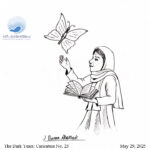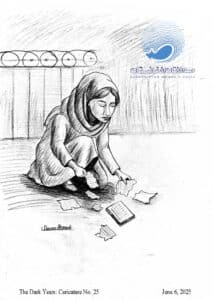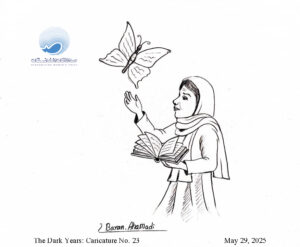Author: Najmuddin Hossaini
Although, women never enjoyed their basic rights fully in the recent decades of Afghanistan’s history, however, the Taliban have extended this inequality and suppression to the maximum extent. It has been more than 300 days that secondary school girls have been prohibited to attend school in Afghanistan. In the same way, the Taliban have shackled many women, who were even the sole breadwinners of families, from going to work and earning money. Many other restrictions, like the travel ban, forcing hijab-wearing, and protesting prevention are imposed on women all over Afghanistan. All these limitations are instituted in a country where massive poverty, drought, committing suicide, and infectious diseases agonize it overwhelmingly. Nevertheless, observing the Taliban’s susceptibilities, we perceive that their inhumane obstacles and human rights violations not only do not come to an end but rather are expanded day by day.
Considering the above preamble, we ask ourselves why the Taliban and other religious fundamentalist groups have such a position toward women? Where are the roots of this idea? Why does the instrumental view of women not end?
In order to answer the above questions, there is no way, but to examine their doctrinal roots. And Since a long discussion is beyond the scope of this text, we will recall and explain some brief premises.
1. Imam Mohammad Ghazali, one of the greatest Muslim scholars, and philosophers determined his stance regarding women and says: The most convincing and solid statement about marriage is that marriage is a form of slavery. A woman is a man’s slave, and therefore a woman’s duty and responsibility is to obey her husband and respond to his every wish. As the Prophet of Islam himself said, a woman who has satisfied her husband until the time of her death, will go to heaven. (Imam Mohammad Ghazali, Ihya-ul-Alum-uddin, Volume 2, p. 64) … Likewise, Ghazali in Kimiai Saadat says: It is better for women to spin yarn at home, not to call their husband anything but good, and to wear hijab from their husband’s acquaintances.
2. Relying on a kind of religious thought, the Taliban tries to manage all aspects of life, including the education of women, from a certain viewpoint. In this way of thinking, any diversity, including sexual diversity, cannot flourish and realize. They want to build a society based on male authority. Therefore, a kind of patriarchal tendency and insistence on the adaptation of religion-oriented values has been observed in their actions and reactions.
3. Most philosophers of religion believe that all religions were invented and continued to exist as male-centric. The centrality of men can be examined in the sequence of prophets and religious elites. If we accept this view, we will have a clearer understanding of the Taliban’s mentality as a religious-based group in their approach to women.
4. If we consider religion as a phenomenon, men benefit from the potential pleasure and central position. The Taliban as a religious group are an accurate example to clarify this speculation. The Taliban have appointed an act-government that does not even include a woman. If we assume the inclusion of a woman in this cabinet, at least the consequence of it, according to the Taliban, is moral corruption, the spread of prostitution, and the disrespect of men.
5. Hannah Arendt, the German philosopher, says: “I am a philosopher, but others don’t consider me a philosopher.” Indeed, she is considered one of the serious political philosophers of the 20th century; but it was men who thought Arendt’s dignity was lower than being a philosopher because of her being a woman. Not only religious knowledge and philosophy, but basically the production and reproduction of all knowledge and techniques have been monopolized by men since the beginning, and its interpretation has been done in a misogynistic way.
Is there hope?
The author thinks, the Taliban still haven’t gotten rid of the male and monopolistic view about freedom, science, education, and society management. According to the writer, the prevailing view of women is superficial, instrumental, gendered, and dualistic. A duality that considers men to be superior, and women to be inferior. This attitude is a kind of commodity vision of human beings. Like more valuable and less valuable goods. And in this thinking attitude, the woman takes second place. The consequences resulting from this perspective lead to moral degeneration, and the collapse of social norms. As minimum aftermath, it won’t be long before a society devoid of moral ideals will emerge, it will overflow and the rapid current will drown it all.
Najmuddin Hossaini has studied philosophy at the University of Pune, India, and freelanced for local and international media outlets.









